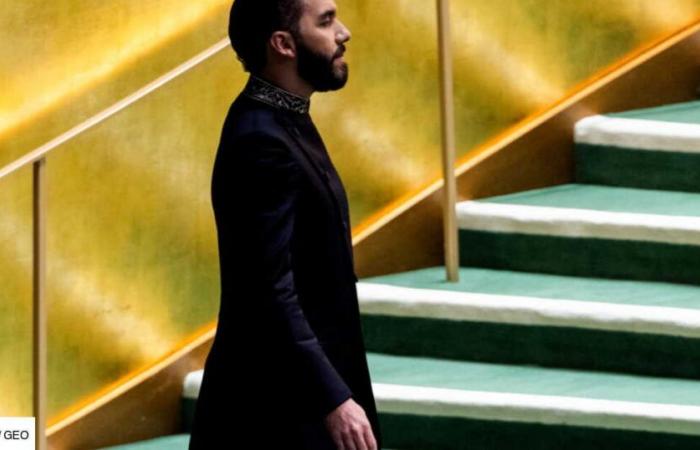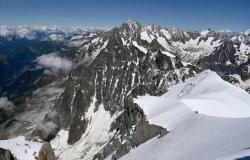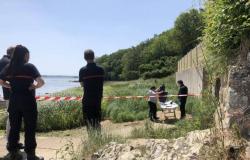“Absurd” ! That’s how El Salvador’s president, Nayib Bukele, first characterized the country’s decision in 2017 to abandon mining in the name of defending the environment. Faced with sluggish growth, he intends to revive it and advances his argument step by step.
El Salvador was the first country in the world to ban any license or concession for open-air or underground metal mines, as well as the use of toxic chemicals such as cyanide or mercury.
At the end of November on his X account, his only communication channel, Mr. Bukele affirmed that “studies carried out in just 4% of the potential area identified 50 million ounces of gold, valued today at $131,565 million. This is equivalent to 380% of GDP”he argued, without citing specific sources.
Guyana: with the military tracking down illegal gold prospectors
“If we exploit our natural resources responsibly, we can change El Salvador’s economy overnight”he estimated a few days later in another series of publications.
The president elected in 2019 will ask Parliament, where his party has an ultra-majority, to repeal the law in order to launch calls for tenders to benefit, according to him, from “the highest density in the world” of gold deposits.
A risky leap into the void
Mr. Bukele’s carefully distilled publications are causing concern among environmental defenders and around fifteen NGOs have called for a rally on Tuesday around Parliament.
“It’s one thing to install a mine in the Atacama desert (in Chile) and it’s another to open an open-cast mine in Chalatenango (northern El Salvador), where the population density is high and there are few forest reserves.”judge with AFP Pedro Cabezas, leader of the Central American Alliance against mines.
Antonio Pacheco, director of the NGO Economic and Social Development Agency (ADES), believes that mining in the Lempa River basin, which supplies the capital with water, “carries a huge risk” et “the harmful effect would reverberate throughout the territory”.
The various NGOs which campaigned for and obtained the 2017 anti-mine law predict “water shortage and pollution”because unlike the Andean countries (Chile, Peru, Bolivia, Argentina), Central America has no mining tradition.
Surface mining is illegal in Honduras, Costa Rica (although the government has hinted at a possible rollback), and Panama declared a moratorium on new mining permits after the country was paralyzed against largest open-cast copper mine in Central America.
“It will create jobs”
After attacking the gangs who terrorized the country with states of emergency and mass arrests, Nayib Bukele must raise the issue of purchasing power: more than a quarter of Salvadorans live in poverty, and nearly 70% of jobs are in the informal sector.
At the foot of San Sebastián hill, in the former mining area of Santa Rosa de Lima (north-east), Bukele’s projects are divisive.
“It will create jobs” et “will benefit everyone”estimates with AFP Rubén Delgado, 55-year-old bricklayer.
José Torres, a 72-year-old independent gold prospector who fears losing his meager source of income, says “The rivers are already polluted, the animals are dying, and we have nothing else here”.
A vocal critic of the mining industry, Jesuit priest Rodolfo Cardenal, believes that “the shine of gold fuels exorbitant fantasies and insatiable greed”. According to this professor at the Central American University, “the Lord has not placed a gigantic treasure under our feet to enrich a multinational and its local relays, or to pollute or destroy lives”.
He questions the interests that Mr. Bukele intends to defend: “Those of the country or those of a multinational?”.
“Challenges”
Economist Carlos Acevedo, former president of the Central Bank of El Salvador, says the figures “spectacular” put forward by President Bukele suggest that El Salvador “is sitting on a gold mine”. According to him, if the veracity of the 50 million ounces of gold is recognized, it would cover four times the country’s external debt of $31 billion, or 85% of GDP.
He emphasizes that the main challenge is to achieve “extract this gold in a socially and ecologically responsible“but warns that despite all the gold in the world “There is no miracle recipe for generating growth overnight”.
According to him, Mr. Bukele’s other challenge will be to achieve “negotiate differently” with the global mining giants, the royalties negotiated with the States during calls for tenders being minimal.
“All rights of reproduction and representation reserved. ©2024 Agence France-Presse. All information (text, photo, video, fixed or animated infographics, sound or multimedia content) reproduced on this page is protected by current legislation on intellectual property rights. Consequently, any reproduction, representation, modification, translation, commercial exploitation or reuse in any manner whatsoever is prohibited without the prior written consent of AFP, with the exception of personal non-commercial use. The AFP cannot be held responsible for delays, errors, omissions which cannot be excluded in the field of press information, nor for the consequences of actions or transactions carried out on the basis of this information. AFP and its logo are registered trademarks »






